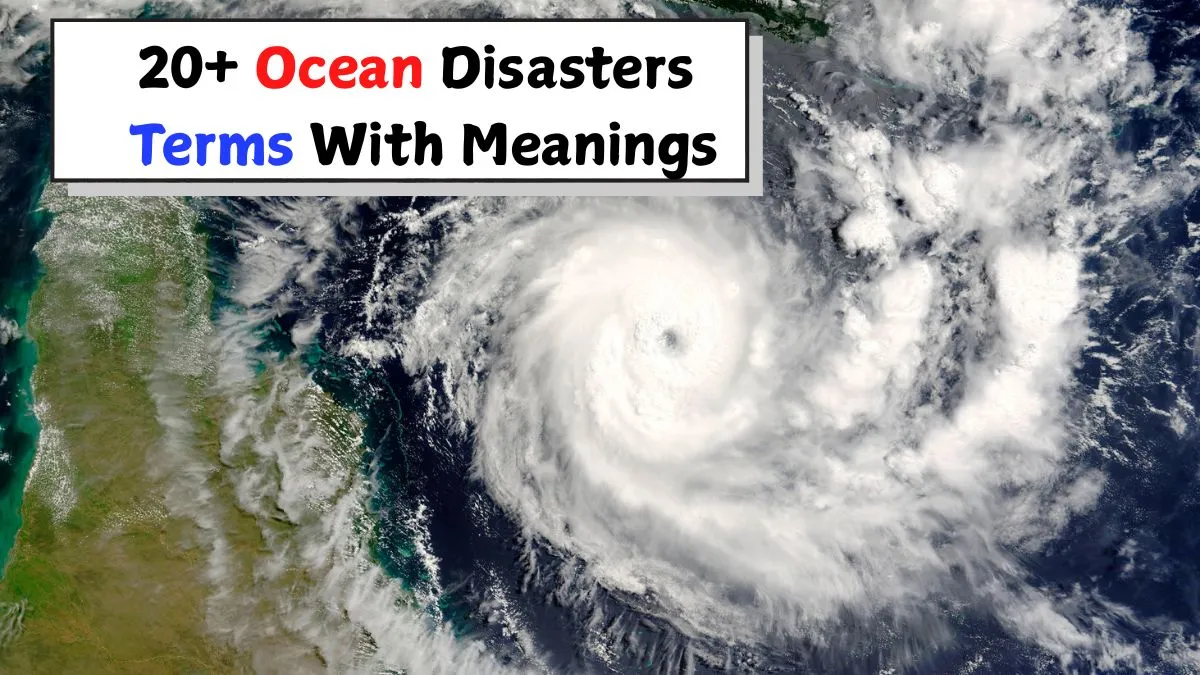- By Aditi Priya Singh
- Wed, 29 Oct 2025 06:10 PM (IST)
- Source:JND
20+ Ocean Disaster Terms: As Cyclone Montha intensifies over the Bay of Bengal, the Indian government, IMD, and communities along the Andhra Pradesh coast are bracing for its impact. The ocean is beautiful, but it can also be extremely powerful and dangerous at times. This demonstrates how quickly weather systems can change and become a major threat. Ocean disasters occur when the sea is struck by extreme natural events or human injuries.
These occurrences, which range from intense storms to abrupt underwater movements, endanger marine life, coastal life, and international shipping. Knowing the proper names for these occurrences enables people to prepare and stay safe while also assisting experts in issuing clear warnings. Anyone who lives close to the water or is simply interested in the natural forces that shape our planet needs to understand these important terms.
20+ Ocean Disaster Terms With Their Meanings- Natural and Man-Made
From tsunamis to Marine Debris, here are 20+ ocean disaster terms that are vital for clear communication, preparedness, and effective emergency response.
| No. | Term | Meaning |
|---|---|---|
| 1 | Tropical Cyclone | A huge, spinning storm system forms over warm ocean water. |
| 2 | Hurricane | The name for a strong tropical cyclone in the Atlantic and Northeast Pacific. |
| 3 | Typhoon | The name for a strong tropical cyclone in the Northwest Pacific Ocean. |
| 4 | Storm Surge | A dangerous rise of seawater pushed onto the land by a powerful storm's winds. |
| 5 | Tsunami | A series of giant waves caused by a large underwater event, like an earthquake. |
| 6 | Oil Spill | The accidental release of crude oil into the sea is massive pollution. |
| 7 | Marine Debris | Any human-made trash (especially plastic) that floats or sinks in the ocean. |
| 8 | Shipwreck | When a ship is destroyed or sinks at sea, often due to storms or accidents. |
| 9 | Coastal Erosion | The steady wearing away of land along the coast by waves and currents. |
| 10 | Rogue Wave | An unusually tall and sudden ocean wave, much bigger than the surrounding waves. |
| 11 | Nor'easter | A powerful storm is moving along the U.S. East Coast, bringing strong winds and rain. |
| 12 | Swell | Long, smooth waves that have travelled far from where they were originally formed by wind. |
| 13 | Tidal Wave | An outdated, informal term often confused with a Tsunami; best to use Tsunami. |
| 14 | Rip Current | A strong, narrow current flowing rapidly away from the shore, dangerous for swimmers. |
| 15 | Dead Zone | An area of ocean or seawater with very low oxygen (Hypoxia), where marine life cannot survive. |
| 16 | Hypoxia | The condition of having severely depleted oxygen in a water body (causing a Dead Zone). |
| 17 | Harmful Algal Bloom (HAB) | A rapid growth of toxic algae, often called a Red Tide, that poisons sea life and shells. |
| 18 | Ocean Acidification | The lowering of the ocean's pH occurs because it absorbs too much carbon dioxide from the air. |
| 19 | Submarine Landslide | A large mass of rock and sediment sliding down a slope underwater can cause a Tsunami. |
| 20 | Search and Rescue (SAR) | Emergency services operations to locate and save people in distress at sea. |
| 21 | Hazard | A potential source of harm or danger, such as a severe storm or high cliffs. |
| 22 | Vulnerability | How susceptible a community or asset is to being harmed by a disaster. |
| 23 | Capsize | When a boat or ship flips over in the water. |
| 24 | Tropical Depression | The first, weakest stage of a Tropical Cyclone with ororganisedirculation. |
| 25 | Seiche | A standing wave in a confined water body (like a large lake or bay) that sloshes back and forth. |
ALSO READ: 30+ Important Trading Terms Every New Trader Must Know
Recommended For You
Risk Management From Ocean Disasters
Even though we cannot physically stop the powerful events in the Ocean, like a major tsunami or a tropical cyclone that is intensifying but human effort can greatly lessen the deadly impact. Building resilience starts with knowing these disaster terms.
1. Clear terminology ensures that warnings about Storm Surge or Harmful Algal Blooms are accurate and acted upon quickly.
2. Risks can be reduced by making investments in things like stronger coastal defences and stringent regulations against oil spills.
3. The best defences against the raw power of the ocean are prompt planning and preparation.
Communities can stop simply reacting to ocean disasters and start actively planning for them by learning and implementing this vital information, which will ultimately save lives and safeguard coastal environments.





